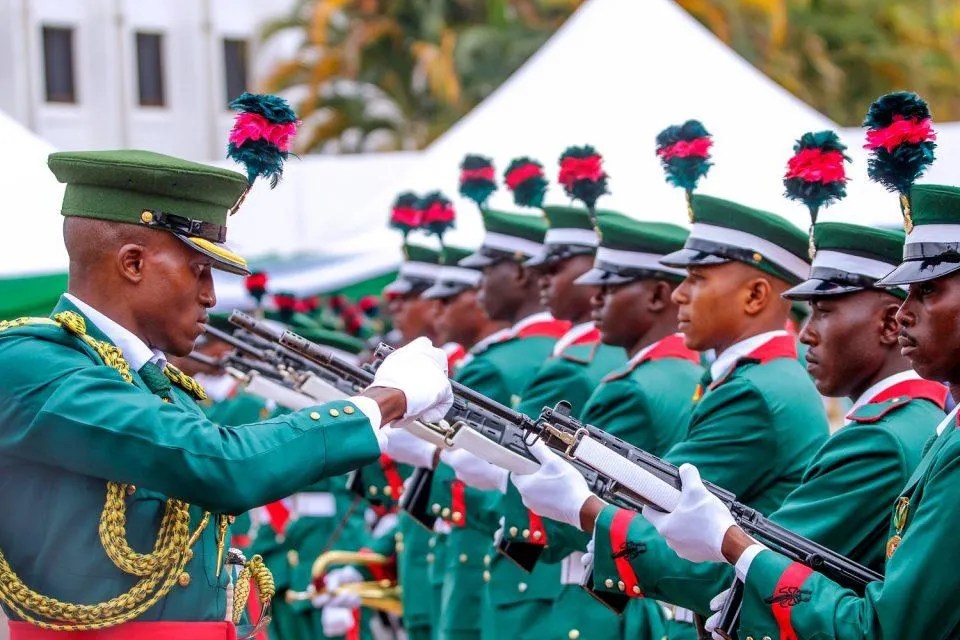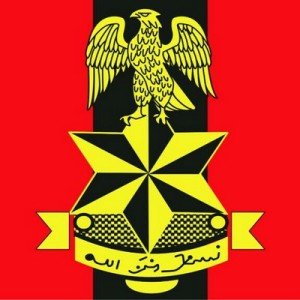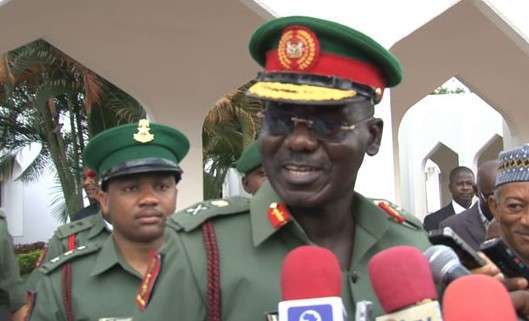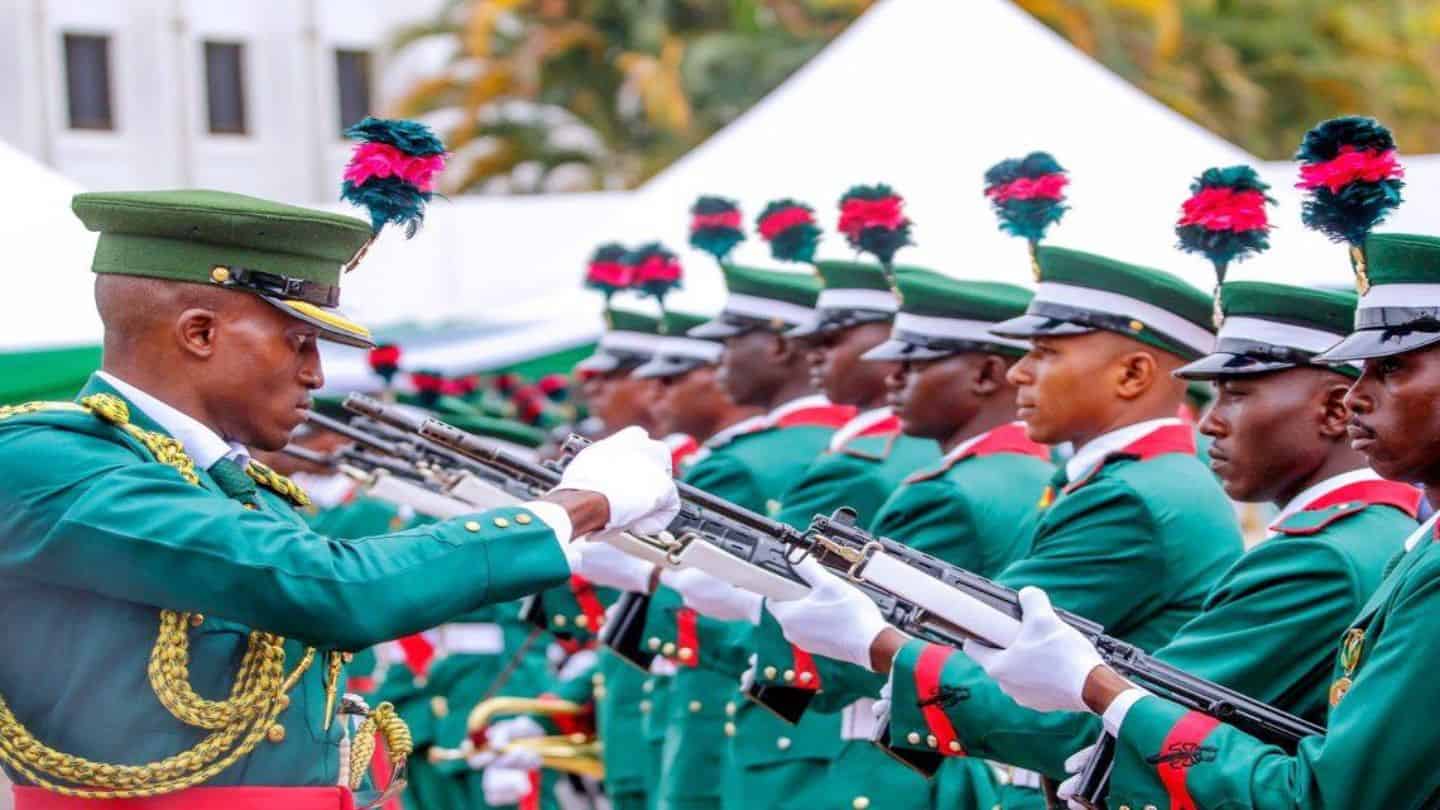
The structure of the Nigerian Army and monthly salary cannot be talked about without harping on the history of this branch of the Armed forces. The history of the Nigerian Army can be traced back to 1863 when the British colonial government established a Constabulary Force in Lagos to maintain law and order. Over time, the force evolved into what was known as the West Africa Frontier Force, which was responsible for maintaining peace and order in the region.
After Nigeria gained independence in 1960, the country formed its own army, which was initially called the Nigerian Military Forces. The first commander of the Nigerian Army was Major General Johnson Aguiyi-Ironsi.
Civil War Era (1967-1970) In 1967, Nigeria was plunged into a civil war after the secession of the southeastern region led to the formation of the Republic of Biafra. The Nigerian Army was instrumental in ending the war, which lasted from 1967 to 1970. The war was one of the bloodiest in Africa’s history, with an estimated one million people losing their lives.
Post-Civil War Era (1970-1999) After the civil war, the Nigerian Army continued to play a vital role in the country’s political and social landscape. During this period, the army was involved in several coups and counter-coups, which led to political instability and military rule.
In 1999, Nigeria returned to democratic rule, and the Nigerian Army has since focused on improving its capabilities and contributing to peacekeeping operations around the world. Nigerian troops have participated in several international peacekeeping missions, including in Liberia, Sierra Leone, and Sudan.
Sadly, despite the pre and post civil war era, the Nigerian army, being one of the largest armies in Africa is still among the least paid armed forces in the world despite being ranked as number 4 in Africa according to Firepower.com.
In this post, we will be giving you the breakdown of the Nigerian army salary structure in 2024 but before we do that, it is necessary to breakdown the structure of the NAF. The Nigerian Army is the land component of the Nigerian Armed Forces, responsible for land-based military operations. It is one of the largest armies in Africa, with a diverse range of units and formations that work together to defend the country’s territorial integrity and support national security.
Nigerian Army Structure Breakdown
Below is an overview of the Nigerian Army’s structure:
1. Infantry Corps:
The Infantry Corps is the largest branch of the Nigerian Army, responsible for conducting ground combat operations. The primary role of the Infantry Corps is to close with and destroy the enemy using a variety of weapons, tactics, and techniques.
The unit is composed of soldiers who are trained and equipped for a wide range of combat operations, including offensive and defensive operations, urban warfare, jungle warfare, and mountain warfare. They are also responsible for providing security and stability operations, as well as supporting other branches of the Nigerian Army in their operations.
The Infantry Corps is organized into various units, including battalions, companies, and platoons. Each unit is led by commissioned officers and non-commissioned officers who provide leadership, training, and mentorship to soldiers.
2. Armoured Corps:
The Armoured Corps is a branch of the Nigerian Army that is responsible for providing armored and mechanized support during ground operations. The primary role of the Armoured Corps is to provide mobility, firepower, and protection to ground troops in combat.
It is a unit composed of soldiers who are trained and equipped to operate and maintain various types of armored vehicles, including tanks, armored personnel carriers, and self-propelled artillery. These vehicles are used to provide direct fire support, suppress enemy positions, and conduct reconnaissance and security operations.
This branch of the Nigerian Army is organized into various units, including regiments, squadrons, and troops. Each unit is led by commissioned officers and non-commissioned officers who provide leadership, training, and mentorship to soldiers.
3. Artillery Corps:
This unit is responsible for providing indirect fire support during ground operations. The primary role of the Artillery Corps is to deliver accurate and timely artillery fire to support ground troops in combat.
The Artillery Corps is composed of soldiers who are trained and equipped to operate and maintain various types of artillery systems, including towed, self-propelled, and rocket artillery. These systems are used to provide long-range fire support, suppress enemy positions, and conduct interdiction and counter-battery fire.
4. Engineer Corps:
This branch of the Nigerian Army is responsible for providing engineering support to ground operations. The primary role of the Engineer Corps is to provide mobility, counter mobility, and survivability support to ground troops in combat.
The Engineer Corps is composed of soldiers who are trained and equipped to construct, maintain, and destroy a variety of structures and obstacles, including bridges, roads, airfields, minefields, and fortifications. They also provide support in the areas of water supply, sanitation, and electrical power generation.
Amongst others, the unit is organized into various units, including regiments, battalions, and companies. Each unit is led by commissioned officers and non-commissioned officers who provide leadership, training, and mentorship to soldiers.
5. Signals Corps:
This branch of the Nigerian Army is one that is responsible for providing communication support to ground operations. The primary role of the Signals Corps is to ensure that reliable and secure communication is maintained between different units during ground operations.
The Signals Corps is composed of soldiers who are trained and equipped to operate and maintain various types of communication systems, including radio, satellite, and computer-based communication systems. They also provide support in the areas of electronic warfare and signals intelligence.
Just like other units, the Signal Corp is organized into various units, including regiments, battalions, and companies. Each unit is led by commissioned officers and non-commissioned officers who provide leadership, training, and mentorship to soldiers.
The Signals Corps is equipped with a variety of communication equipment, including radios, telephones, and computer systems. They also have access to specialized equipment, such as satellite communication systems, encryption devices, and electronic warfare equipment.
6. Intelligence Corps:
The Intelligence Corps is responsible for gathering and analyzing intelligence to support ground operations. The primary role of the Intelligence Corps is to provide timely and accurate intelligence to ground troops in combat.
The unit is composed of soldiers who are trained and equipped to collect, process, and analyze information from a variety of sources, including human intelligence, signals intelligence, and imagery intelligence. They also provide support in the areas of counterintelligence and security.
In addition, the organized into various units, including intelligence battalions, companies, and platoons. Each unit is led by commissioned officers and non-commissioned officers who provide leadership, training, and mentorship to soldiers.
This branch of the Nigerian army is equipped with a variety of intelligence-gathering equipment, including surveillance and reconnaissance equipment, communication intercept equipment, and computer systems for data processing and analysis.
Training for the Intelligence Corps is rigorous and demanding, with an emphasis on analytical skills, language proficiency, and the ability to operate in a variety of environments. Soldiers in the Intelligence Corps undergo specialized training in a variety of areas, including intelligence collection, analysis, and dissemination.
7. Medical Corps:
This branch of the Nigerian Army takes responsibility for providing medical support to ground operations. The primary role of the Medical Corps is to ensure the health and well-being of soldiers and civilians during ground operations.
This unit is composed of soldiers who are trained and equipped to provide medical care in a variety of settings, including combat zones, field hospitals, and military medical centers. They provide a range of medical services, including emergency care, trauma care, surgery, and preventive medicine.
The Medical Corps is organized into various units, including medical battalions, companies, and platoons. Each unit is led by commissioned officers and non-commissioned officers who provide leadership, training, and mentorship to soldiers.
Like other units of the Army, the medical corps is equipped with a variety of medical equipment and supplies, including field medical kits, ambulances, and mobile hospitals. They also have access to specialized medical equipment, such as X-ray machines and surgical equipment.
8. Supply and Transport Corps:
This department of the Nigerian Army is responsible for providing logistics support to ground operations. The primary role of the Supply and Transport Corps is to ensure that troops have the necessary supplies and equipment to carry out their missions.
The Supply and Transport Corps is composed of soldiers who are trained and equipped to manage the logistics of the army, including procurement, storage, and distribution of supplies and equipment. They also provide support in the areas of transportation and maintenance.
The unit is equipped with a variety of logistics equipment, including trucks, trailers, forklifts, and warehouses. They also have access to specialized logistics equipment, such as fuel tankers and ammunition carriers.
9. Ordnance Corps:
This unit of the Nigerian Army is held accountable for the maintenance and repair of military equipment and weapons. The primary role of the Ordnance Corps is to ensure that the army’s weapons and equipment are in good condition and are always ready for use in ground operations.
The Ordnance Corps is composed of soldiers who are trained and equipped to perform maintenance, repair, and inspection of weapons, vehicles, and other military equipment. They also provide support in the areas of quality control and safety management.
The department equipped with a variety of maintenance and repair equipment, including welding machines, vehicle lifts, and diagnostic tools.
Salary Structure of the Nigerian Army for Commissioned and Non-commissioned Officers
The salary structure of the Nigerian Army is divided into two categories: commissioned officers and non-commissioned officers.
Commissioned officers are the highest-ranking members of the Nigerian Army, responsible for leading troops, planning and executing military operations, and managing military resources. In the Nigerian Army, there are three categories of commissioned officers:
- Regular Combatant Commissioned Officers: These are officers who are commissioned into the Nigerian Army through the Nigerian Defence Academy (NDA) or Direct Short Service Commission (DSSC) and are trained in both combat and non-combat roles.
- Direct Regular Commissioned Officers: These are officers who are commissioned directly into the Nigerian Army as specialists, such as medical doctors, lawyers, and engineers. They are trained in both combat and non-combat roles.
- Short Service Combatant Commissioned Officers: These are officers who are commissioned into the Nigerian Army for a short period, usually six to nine years. They are trained in combat roles only and are usually deployed for peacekeeping missions.
The rank structure of commissioned officers in the Nigerian Army, in ascending order, is as follows:
- Second Lieutenant
- Lieutenant
- Captain
- Major
- Lieutenant Colonel
- Colonel
- Brigadier General
- Major General
- Lieutenant General
- General
Commissioned officers are expected to possess strong leadership skills, excellent communication skills, and high levels of physical and mental fitness. They must also be able to make sound decisions under pressure and lead their troops through difficult and challenging situations.
The monthly salary of a Nigerian Army commissioned officer varies based on their rank and years of service. The salary structure is as follows:
- Second Lieutenant – N120,000 – N180,000
- Lieutenant – N180,000 – N220,000
- Captain – N220,000 – N260,000
- Major – N300,000 – N350,000
- Lieutenant Colonel – N350,000 – N400,000
- Colonel – N550,000 – N600,000
- Brigadier General – N750,000 – N800,000
- Major General – N950,000 – N1 million
- Lieutenant General – N1.5 million – N1.8 million
- General – N2 million and above
2. Non-commissioned Officers:
Non-commissioned officers (NCOs) are an important part of the Nigerian Army, responsible for providing leadership, training, and mentorship to soldiers. They are senior enlisted members who have risen through the ranks, demonstrating proficiency and leadership abilities.
In the Nigerian Army, there are two categories of non-commissioned officers:
- Junior Non-Commissioned Officers (JNCOs): These are enlisted members who hold ranks between Lance Corporal and Sergeant.
- Senior Non-Commissioned Officers (SNCOs): These are enlisted members who hold ranks between Staff Sergeant and Warrant Officer.
The rank structure of non-commissioned officers in the Nigerian Army, in ascending order, is as follows:
- Lance Corporal
- Corporal
- Sergeant
- Staff Sergeant
- Warrant Officer Class Two
- Warrant Officer Class One
Non-commissioned officers play a vital role in the Nigerian Army, serving as mentors and leaders to junior soldiers. They are responsible for the day-to-day management of soldiers, including training, discipline, and welfare. They also serve as a link between officers and soldiers, ensuring that orders are properly communicated and executed.
To become a non-commissioned officer in the Nigerian Army, soldiers must demonstrate leadership abilities, strong technical skills, and a commitment to the values and traditions of the military. They must also meet specific requirements for each rank, such as completing training courses and demonstrating proficiency in their chosen field.
The monthly salary of a Nigerian Army non-commissioned officer varies based on their rank and years of service. The salary structure is as follows:
- Private – N49,000 – N55,000
- Lance Corporal – N54,000 – N59,000
- Corporal – N58,000 – N63,000
- Sergeant – N63,000 – N68,000
- Staff Sergeant – N68,000 – N73,000
- Warrant Officer Class II – N80,000 – N90,000
- Warrant Officer Class I – N90,000 – N100,000
It’s worth noting that the figures stated here are the approximates and may vary slightly depending on various factors, including years of service, allowances, and other benefits.
Please feel free to add your comments below and share.




